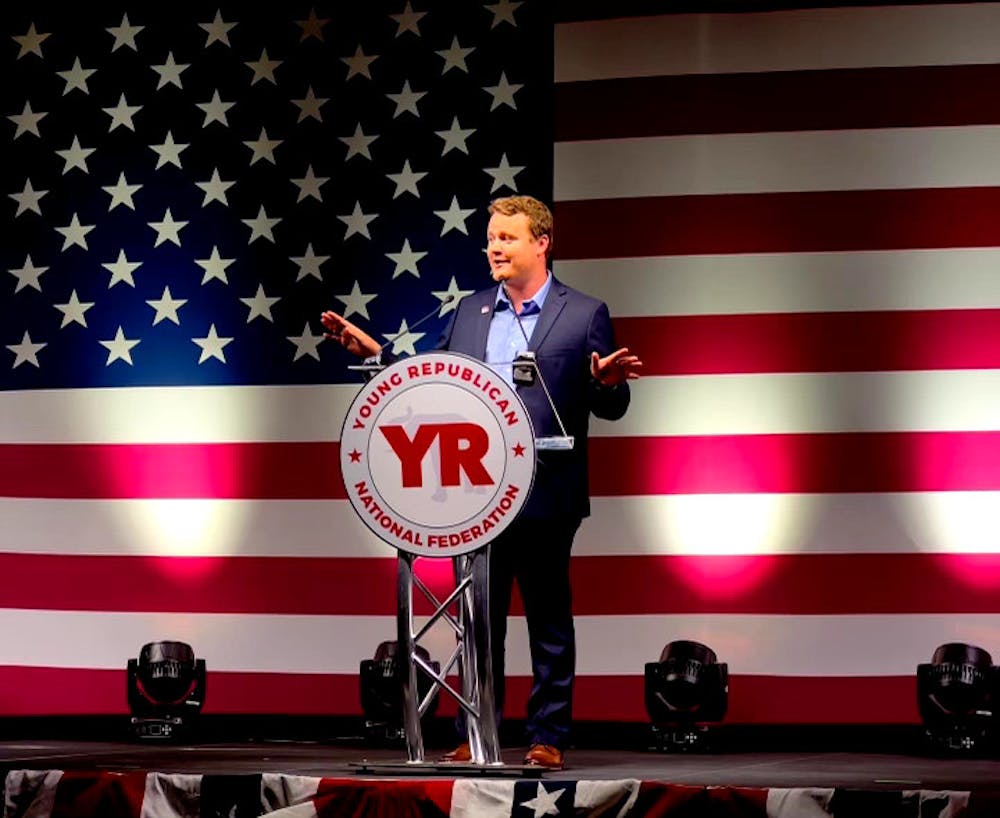As an incoming freshman searching for new friends, Abigail Echenique, who is conservative, sought to find a community within her political affiliation.
Her search was over once she joined the Network of Enlightened Women, a conservative nonprofit organization that fosters political discussions among college women, in 2021. The now 20-year-old UF nursing junior served as the vice president of the organization last year. The group currently has about 60 members.
“I think that a lot of times girls are more hesitant to come forward and say that they are conservative,” Echenique said. “There's more room for judgment because the narrative of women in college is that they're liberal.”
Younger generations historically lean more liberal on the political spectrum, namely Gen Z, or people born in the 1990s and early 2000s, according to data from the Pew Research Center. But that trend doesn’t reign true for younger conservatives like Echenique. In Alachua County, there are 4,291 registered Republican voters ages 18-24.
Besides the Network of Enlightened Women, she said young conservatives like political commentator Candace Owens provide mainstream representation for female conservatives. Echenique said Republican values are commonly associated with older white males.
“Stereotyping doesn’t serve anyone,” she said.
Liberal and conservative voters tend to be divided on topics pertaining to abortion, immigration, international relations, gun rights, race and equity and LGBTQ+ rights. Recent years have seen political disconnect over the Black Lives Matter movement, the overturning of Roe v. Wade and transgender rights and gender-affirming care.
Stephen Craig, a UF political science professor, teaches a political behavior course. The class examines the relationship among age demographics, political beliefs and voting patterns.
Younger generations tend to vote more left, which is not a new phenomenon, he said. There is also an ongoing pattern of voters leaning more conservatively as they age.
“The idea is that as you get older, and your life becomes more settled, and you are more likely to get married and start a family and such, that you tend to become more conservative,” he said.
In 1972, the baby boomer generation, which includes people ages 57-75, voted in favor of Democratic presidential nominee George McGovern over Richard Nixon, the Republican incumbent.
Even though majority support for McGovern was a slim difference, Craig said the trend of baby boomers beginning to vote conservatively into the 2000s indicates the common trend of how people vote over time.
Generational turnover, or the influx of new voters, is not a new concept that researchers and scholars look to for understanding voting behavior, he said. Incoming generations tend to become more liberal and favor things like racial and ethnic diversity and more involvement from the government.
Brandon Ludwig, the 23-year-old chairman for Florida Young Republicans, said misconceptions about most younger conservative voters lead to infighting within Gen Z.
“There's a lot of things, believe it or not, that young conservatives and young progressives will agree on,” he said. “Unfortunately, you have some people that just focus on the few things that do divide us.”
Ludwig, who graduated from the University of North Florida in 2020, originally planned on pursuing a career in broadcast journalism but turned to politics after COVID-19 hurt the job market, he said.
Having interned for former U.S. Rep. Ted Yoho in high school, he turned to U.S. Rep. Kat Cammack’s campaign to help engage rural voters in Clay, Bradford and Union Counties. Now with the Florida Young Republicans, he works to recruit, train and elect young conservatives to office.
“The Democratic side — they elevate these younger voices, whereas on the Republican side we need to do a better job of doing that," he said."
Younger conservatives make up a more diverse voting populace than people might expect, he said, especially among Florida Young Republicans’ more than 1,000 members. The Gen Z voting demographic might not be as divided on key issues as others think, he said.
For instance, Cammack was among the 47 House Republicans who voted in favor of the Respect for Marriage Act, which “establishes statutory authority for same-sex and interracial marriages.” President Joe Biden signed the bill into law Dec. 13, 2022. The decision reflects the sentiment among most of Ludwig’s cohort about limited government, he said.
“If you turn off these national outlets and you read your local paper or things of that nature, people aren't really sitting there hating on each other day in and day out,” he said.
Dismantling the idea that most younger Republican voters are hateful is important to Michael Andre, an 18-year-old UF finance freshman. He joined UF College Republicans to find like-minded people with the expectation that the college demographic would feel largely liberal.
“I do think that most of the time when I walk in the room, my opinions are not the most widely held,” he said.
Andre champions harsher immigration regulations to prevent demographic replacement, which predicts in the following decades white Americans will no longer be the racial majority in the U.S.
However, this predominantly conservative view does not make him or his Republican peers racist or xenophobic, Andre said. The mainstream media’s portrayal of Republican voices paints them as hateful, which might make up-and-coming conservative voices hesitant to share their ideas, he said.
“We hear about getting canceled,” he said. “We hear about it maybe affecting our jobs and quite frankly, that is a scary and not even a completely irrational thought.”
Contact Sophia Bailly at sbailly@alligator.org. Follow her on Twitter @sophia_bailly.
Sophia Bailly is the Fall 2024 University Editor. She interned for The Times-Picayune in Louisiana this past summer as a Capitol News Bureau reporter. When she's not reading the news, she can be found listening to podcasts, going for a run or studying Russian.






